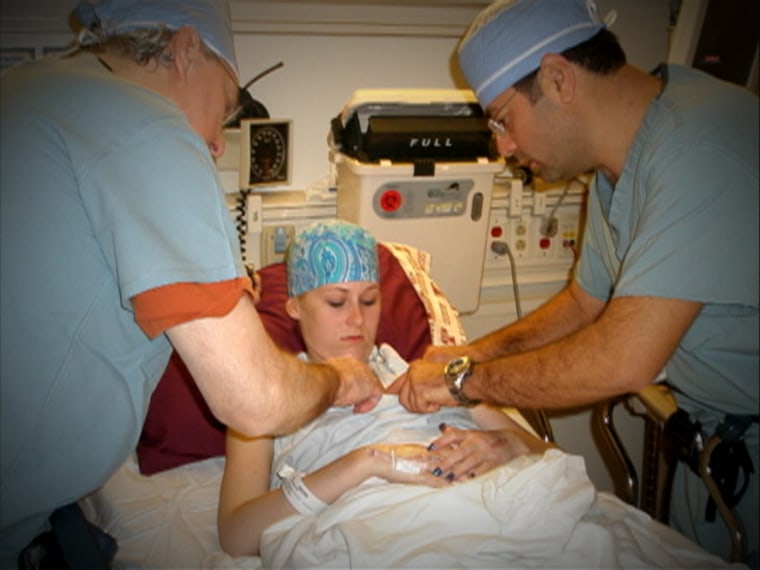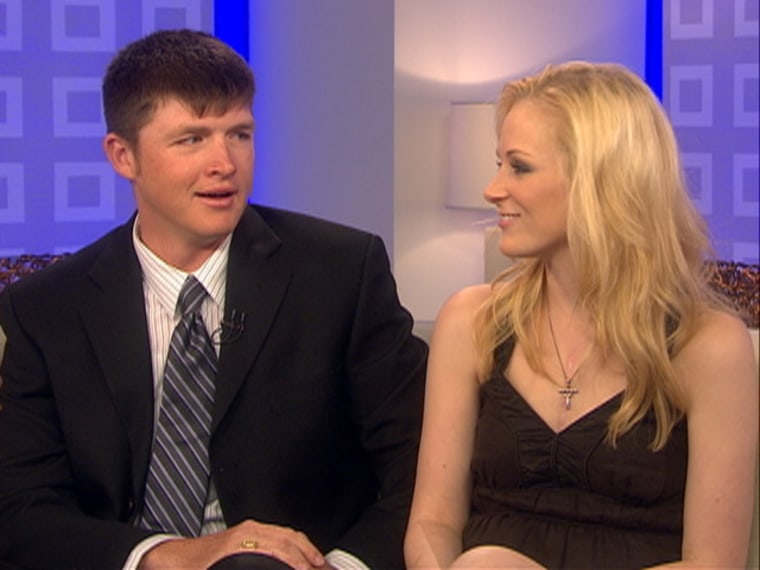Ally Smith Babineaux, the 23-year-old newlywed dubbed “The Bionic Bride” for her heroic struggle against a rare heart disease helped by a revolutionary heart pump, has improved but remains in critical condition at the Texas Heart Institute following heart failure and a series of cascading problems that shut down her kidneys, caused her liver to fail, ravaged her lungs and left her fighting for her life over the weekend.
“She is a little better today,” Dr. Roberta Bogaev told TODAYshow.com on Tuesday. “She remains on dialysis for her kidney failure, her liver is improving though it’s not back to normal, and we are able to start slowly weaning her from the ventilator.”
“She’s not yet awake because the sedation medicine is going to take a lot longer to wear off because her liver is not metabolizing those drugs,” Bogaev said. “Her liver function is improving but it hasn’t returned to normal.”
“A transplant is still going to be her best option,” Bogaev added, “but right now, she’s very sick for a transplant, and we would like to see her kidneys improve to the point where we can get her off dialysis and for her liver function to return to normal and get her off the ventilator. That’s the goal.”
Babineaux was just a freshman at Texas A&M when she was diagnosed in 2006 with viral cardiomyopathy — a progressive heart disease that weakens the heart and often leads to organ failure. It had afflicted the left ventricle of her heart.
Despite her grim prognosis — even with aggressive therapy, the chances of surviving a year with cardiomyopathy are only 50 percent — Babineaux remained upbeat. So did her then-boyfriend, Mike Babineaux, and in 2008, the young couple defied the long odds and got engaged.
A short time later, the young woman underwent surgery to implant a mechanical heart pump. The device, known as the HeartMate II, took over the pumping function of Babineaux’s weakened muscle, essentially doing the heart’s work for it, allowing it time to rest — and, hopefully, heal.
Reversal of fortune
It worked well enough that last summer, Ally and Mike were married. And in the months that followed, family members told TODAY, Babineaux became increasingly certain that her heart had recovered sufficiently that the pump could be removed.
But last Friday, Jan. 21, Babineaux took a turn for the worse, her mother Krista Smith, said. While her left ventricle was strong, the right side of her heart was beginning to fail, and rapidly, Smith said.
Six times that day, Babineaux’s implanted defibrillator and pacemaker fired to try to stabilize her erratic heartbeat. It was a stunning reversal of fortune, Smith said. “Two weeks ago we thought we would be able to … take the pump out,” Smith said. “But then, they did a couple of tests and she just did not do well.”
Babineaux was placed of the top of the list for a heart transplant, and doctors and nurses worked feverishly to save her life as her family members maintained a vigil at the young woman’s bedside throughout the weekend. Her kidneys failed, so did her liver, and her breathing became labored enough that doctors feared that the stress would overcome her already damaged heart, Smith said.

“It was just a vicious cycle,” Smith told TODAYshow.com. “When one thing happens it leads to the next, and leads to the next.”
There was another complication as well. Babineaux's doctors had originally suspected that the disease that had ravaged the left side of her heart was viral, and as bad as that was, Bogaev said, it was manageable. The virus could be treated, and, with the aid of the pump, the heart would likely recover, Bogaev said. In the meantime, Babineaux could rely on the heart pump.
But upon closer inspection, doctors discovered that there was another, more ominous problem: “There is one small segment that looked like a different type of heart failure, something that people are born with, and it progresses as they get older," Bogaev said. "We suspect that that is the predominant cause of her heart failure. And that’s why it is progressing to the right side of her heart."
There is, Bogaev said, only one reliable way to treat that. "Really, the only therapy would be to replace the heart with a transplant."
Babineaux's condition, she said, was complicated by the mix of blood thinners she was on. "Those made it more difficult to control,” Bogaev said. "We couldn’t run the pump at the previous speed because it would overtax the right ventricle. So we had to turn the pump speed down and when all of that happened, she went into kidney failure."

The young woman had to be placed on a respirator, "and the lower pump speed also dropped her blood pressure. Then her liver started to fail.” By Sunday, "we were looking at respiratory failure, kidney failure, and liver failure, and she was at a point where she was too sick; we couldn’t even transplant," Bogaev said.
But by Monday morning, doctors had balanced her medication, and by Monday afternoon, they were starting to see some significant improvement. "Fortunately the right side of her heart is doing better on some of the IV medicine," Bogaev told TODAYshow.com on Monday evening.
For the first time in days, Bogaev said, there's cause for optimism. "I’m much more optimistic today than yesterday — the fact that we’re already starting to see some improvement in what we call her end organs, her kidneys, her lungs, her liver, is a good sign. And what we’ll need to see is more improvement in those organs before we can transplant her, of course.”
Thoughts for othersDespite her own life-and-death struggle, Babineaux still found time to worry about others. As she arrived at the hospital, she confided to her mother that she felt as if she had let down other patients who were depending on the same technology to keep them alive.
“I said, ‘No, honey, you haven’t,’ ” Babineaux’s mother, Krista Smith, said. “‘The pump has done what the pump was supposed to do; it’s kept you alive for a year when you shouldn’t be here … The only way you could let anybody down was if you didn’t follow doctor’s orders, if you didn’t take your medicine, if you didn’t exercise and you didn’t eat right … You’ve done all those things; there’s no way that you’ve let anybody down. It’s just your heart can’t handle what it needs to do. Your heart is broken. We tried to fix it. It won’t fix, and there’s nothing that you can control about that.’ ”
Smith said she takes some solace in the knowledge that her daughter’s struggle still touches so many people. Some, she said, are friends, people Babineuax knows personally.
On Saturday, for example, a college classmate stopped by the hospital. “After he saw her, I was out in the hall and he came up,” Smith related. “There’s a big significance to the graduation ring from A&M … he took his off and gave it to me and said, ‘I want you to put this on her finger because it’s brought me so much luck … I want her to keep it until she’s well and out of here.’
“I took it and went into the room and put it on her finger,” Smith said. “She’s a fighting Aggie.”
But Babineaux also has touched the lives of strangers, Smith said. “I can’t tell you how much it means: All the people she’s gotten to help because they saw her story and have called in and didn’t even realize they were in heart failure…or other people that she’s helped get pumps that didn’t know that the pump existed.
“It’s been a blessing.”